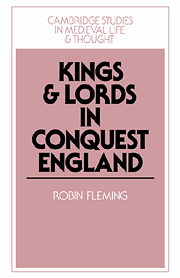Book contents
- Frontmatter
- Contents
- List of figures
- List of tables
- Preface
- List of abbreviations
- PART I CNUT'S CONQUEST
- PART II THE NORMAN CONQUEST
- 4 Domesday Book and the tenurial revolution
- 5 Territories and time
- 6 Private enterprise and the Norman settlement
- 7 Aristocratic landholding and royal power in the eleventh century
- Bibliography
- Index
4 - Domesday Book and the tenurial revolution
Published online by Cambridge University Press: 09 October 2009
- Frontmatter
- Contents
- List of figures
- List of tables
- Preface
- List of abbreviations
- PART I CNUT'S CONQUEST
- PART II THE NORMAN CONQUEST
- 4 Domesday Book and the tenurial revolution
- 5 Territories and time
- 6 Private enterprise and the Norman settlement
- 7 Aristocratic landholding and royal power in the eleventh century
- Bibliography
- Index
Summary
Orderic Vitalis, after completing his long and compelling account of the perils overcome by William the Conqueror in 1069–70, paused to describe the hard-won rewards of some of the new king's most loyal followers. Hugh d'Avranches, so he tells us, received the county of Chester, Roger de Montgomery Arundel and later Shropshire, and Eudo of Champagne Holderness. Orderic goes on at length about the new lands of ‘earls and magnates too numerous to name’. He ends his catalogue of earldoms and fees, however, with a sobering remark, to remind his audience upon what hardships Norman prosperity in England was founded:
So foreigners grew wealthy with the spoils of England, whilst her own sons were either shamefully slain or driven as exiles to wander hopelessly through foreign kingdoms.
The Peterborough Chronicler, too, describes the lands acquired by William's companions. As the monk recounts the plagues, fires and famines of 1087, he writes:
The king sold his land on very hard terms – as hard as he could. Then came somebody else and offered more than the other had given, and the king let it go to the man who had offered him more. Then came the third, and offered still more, and the king gave it into the hands of the man who offered him most of all, and did not care how sinfully the reeves had got it from poor men, nor how many unlawful things they did.
- Type
- Chapter
- Information
- Kings and Lords in Conquest England , pp. 107 - 144Publisher: Cambridge University PressPrint publication year: 1991



